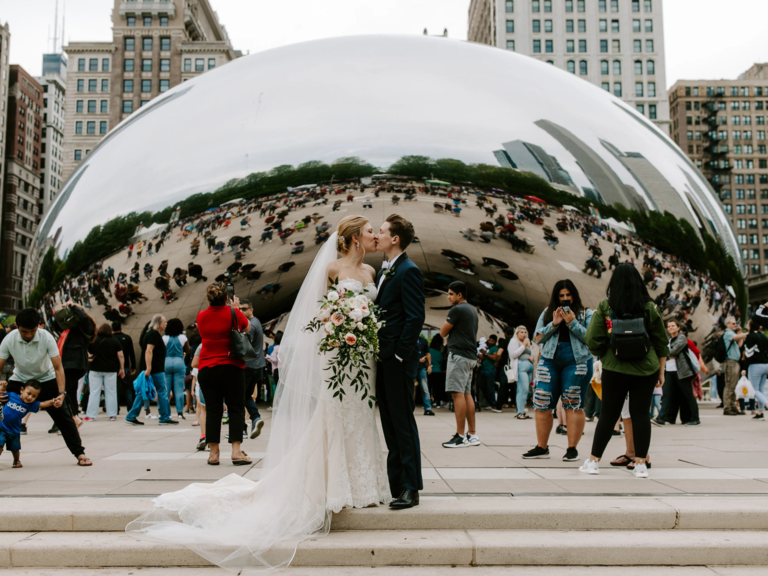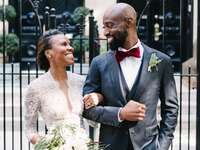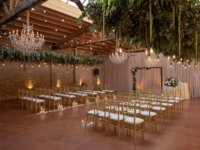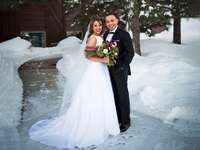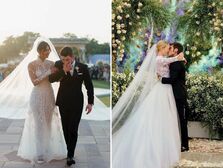How to Easily (and Legally) Get Married in Illinois
There are many reasons couples might consider an Illinois wedding. The state—and especially its epicenter of Chicago—offers incredible venues and resources for weddings. It's also convenient: Illinois is centrally located in the US and with multiple international airports for guest travel. As for exactly how to get married in Illinois, it's important to know Illinois marriage laws, consider average costs and benefits and rank your priorities: Do you prefer wide open spaces for photography and lower price tags? Or do you love the urban architectural feel of Chicago? Are you a summer or winter wedding couple? (The good news: Illinois does both seasons beautifully!)
To help outline the process and fill in the need-to-knows about getting married in Illinois, we turned to two experts in the wedding world. Arin Busch is a senior wedding planner at Chicago's Big City Bride, and Olivia Leigh is a prolific Chicago-based wedding photographer and owner of Olivia Leigh Photographie.
In this article:
- How to Get a Marriage License in Illinois
- Notable Wedding Locations in Illinois
- How to Plan a Wedding in Illinois Step-by-Step
How to Get a Marriage License in Illinois
There are 102 counties in Illinois, from teeny tiny Pope County (population 3,700) to mega-size Cook County (Chicago's home, with a population of more than 5 million). This is important as counties—rather than the state or individual cities—are what issue each Illinois wedding license.
The Illinois marriage license requirements vary from county to county, but the laws are the same across the state: Couples must be 18 years of age or older (16 and 17 with parental consent and legal guardian appearance) and not blood-related; they must show proof of ID and, if divorced, show proof of divorce. Same-sex couples were granted the right to legal marriage in Illinois in 2014. It's best to consult your county's government website, as some require an Illinois marriage license application filled out in advance (looking at you, Lake County), and others offer appointments. Fees also vary, ranging from $32 in Kane County to $60 in Cook County to $75 in Peoria County.
An important key point: An Illinois marriage license is only valid in the county in which it was issued. So, if you live in the suburbs but are getting married in Chicago, for instance, you need to get your marriage license in Cook County.
A state of Illinois marriage license is valid for 60 days, meaning you need to hold your wedding ceremony within 60 days of acquiring the license. Note that the licenses don't become valid until the day after they are issued, so you cannot get married the same day you acquire the license.
Notable Wedding Locations in Illinois
Chicago is a go-to destination for weddings and events of all kinds and boasts a whole community of talented vendors to bring them to life. But, even outside the Windy City, there are quaint downtowns, stunning landscapes, golf clubs and rural resorts. So, it goes without saying that Illinois wedding venues truly run the gamut. Here are a few hot spots to check out.
Chicago
If you want top-tier talent to bring your wedding to life, Chicago is the place to find it. "Chicago is an amazing city for weddings, in large part due to the incredible creative professionals that are based here," Leigh says. "Simply put, the talent here is unparalleled, from international design firms to Michelin-starred chefs, phenomenal bands to nationally known photographers and cinematographers. Chicago offers world-class talent that is still rooted in Midwestern hospitality and kindness, which makes for gorgeous but warm and inviting weddings." It has another major advantage, especially for couples with global guest lists. "Chicago is in a central location," Busch says. "We have two major airports that make it an easily accessible location to celebrate." Any wedding vision can be brought to life here: The city boasts historic wedding venues, modern art museums, wide-open converted warehouses, intimate supper clubs and so much more, plus high-end hotels, venues and activities to keep guests entertained all weekend long.
Suburbs of Chicago
The Windy City's surrounding region is full of rural venues that offer city-worth amenities and near access to top city vendors—it's the best of both worlds. Think: golf and country clubs, urban farms and upscale barns. The North Shore is a particularly gorgeous area, with lakeside venues and top-tier vendors; it's also home to the incredible Chicago Botanic Garden. Another plus? Suburban Chicago wedding venues are typically near an airport—O'Hare to the northwest and Midway to the South—for any guests traveling in for the wedding. From a photography perspective, "the advantage of the suburbs or small towns are the more wide-open, natural spaces, and these settings really shine in the summer and fall," Leigh says. "My favorite weddings to photograph are ones at private residences or in tents, and the long days of June to September make for gorgeous light to work with all day and into the night."
Galena
A surprising resort town in the northwest corner of the state, Galena is home to a stunning state park, a quaint downtown and plenty of unique wedding venues. Some of the venues are hotel resorts that offer their own lodging—check out Eagle Ridge Resort & Spa—but there is also an abundance of chic rentals in the area on Airbnb for guests to explore.
Champaign-Urbana
If you're looking for somewhere in the southern part of the state, consider the Champaign-Urbana area. It holds special significance for college sweethearts from the University of Illinois but, even if you didn't meet there, the area is full of hotels, venues and amenities that make it a practical spot for a wedding. Plus, the area just outside town boasts renovated barns and historic venues if you're going for a rustic vibe.
How to Plan a Wedding in Illinois Step-by-Step
If you are getting married in Illinois, there are some important factors to consider. How much does planning a wedding cost here? When can you get married in Illinois (or when should you, from a seasonal photography perspective)? What sort of vendors do you need? Here, we break down some of the most important steps for Illinois marriages.
1. Set a Budget
No matter what state you're saying "I do" in, setting a budget should be one of the very first steps in wedding planning. The national average for a wedding cost is around $30,000, and Illinois in general falls in that range as well; however in Chicago, the average wedding cost is closer to $55,000—and can go much higher than that. "We see budget ranges of all kinds in Chicago, especially since celebrations aren't so cookie-cutter post-COVID," Busch says. "Budget is really dependent on a couple's priorities, and there is definitely a little more wiggle room once you go outside the city." So, where to begin? Check out The Knot Budget Advisor, which helps couples learn more about wedding costs in their state based on data from real couples.

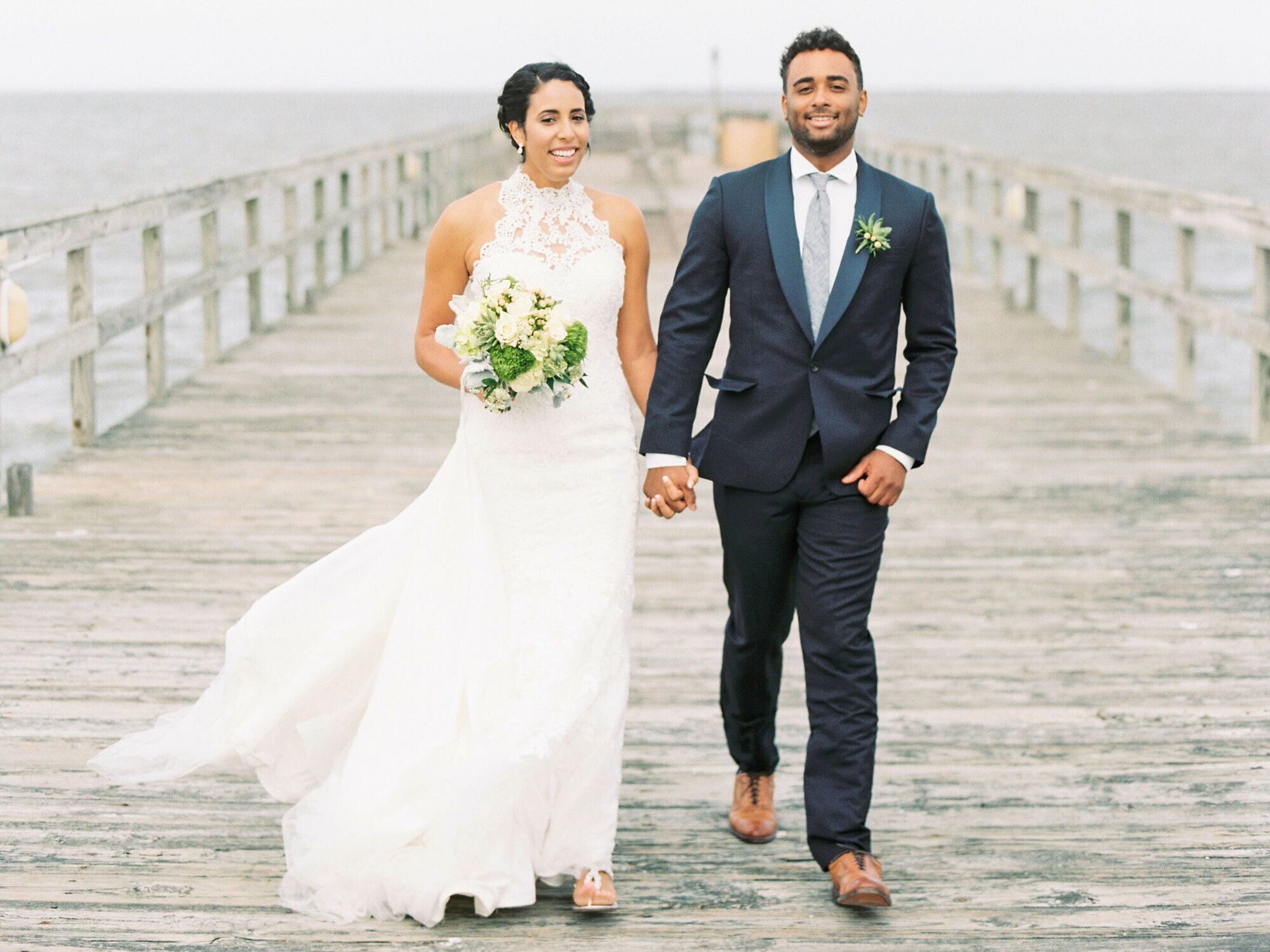
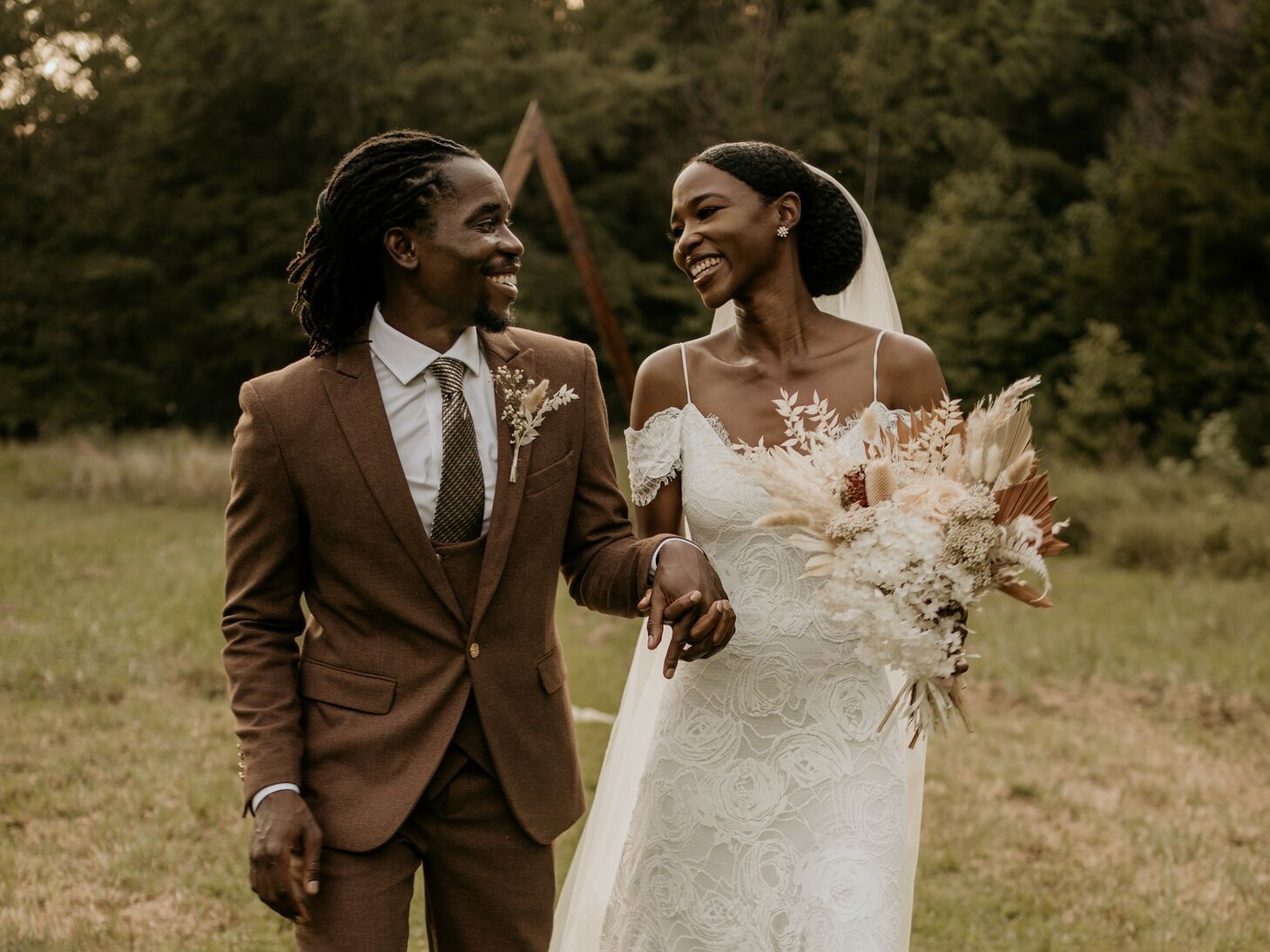
2. Check the Calendar
As much as you'd like to think your wedding will be the center of the universe, Illinois, and especially Chicago, is a diverse hub of activity. "When looking at the city, or anywhere in Illinois for that matter, it is vital to consider the local festival and convention calendar," Busch says. "It can be such a nightmare for you and your guests if your date lines up with a major event." Leigh agrees. "Whether it's Lollapalooza, NASCAR, the Chicago marathon, a large conference or Mexican Independence Day, Chicago is host to many amazing events that make for a vibrant and exciting city, but one that can really impact traffic or your hotel blocks and cause unanticipated stress."
3. Choose a Season
June through October is considered high season for weddings in Chicago, Busch says. "However, since I began planning, I have noticed quite an increase in activity in months outside that range," she adds. "Some couples choose to embrace the off months and take advantage of vendor availability or off-season pricing." While the weather is more predictable in the summer months—though in Illinois, you really never know!—it can be considerably more expensive to hold a wedding then. Leigh sees the appeal in any season. "The fall is a magical time of year with perfect temperatures, great fall colors and fewer big events to contend with in the city," she says. "September is always the busiest month, but even into November, the weather can be amazing. On the flip side, a true winter wedding in Chicago can sound risky but can also be magical, with the iconic architecture and beautiful indoor venue options making for a weekend people can look forward to in the midst of a long winter." Though winter can be unpredictable, it's typically safe to assume roads will be cleared in a timely manner in Chicago. If you're saying "I do" in more rural areas, make sure there are no potential hazards that would make it difficult for guests to get to the wedding.
4. Secure Vendors
Once you have a budget in place, it's time to start booking vendors. (Psst, start at The Knot Vendor Marketplace, where you can find everything from reception venues to makeup artists.) While Chicago boasts some world-class vendors (Chicago-based HMR Designs, for example, has become a go-to for over-the-top celebrity wedding florals and decor), there is an abundance of incredible and creative vendors for every budget level and wedding style. Decide which categories are most important to you—do you prefer abundant lush florals or a high-energy live band?—and begin with those.
5. Book Early
There was a backlog of weddings post-COVID, and even now that things have sorted out, couples are still booking vendors for their weddings earlier than in the past. "We are seeing some of the popular venues and vendors book well over one and a half years in advance," Busch says. Be cognizant of that as you are looking; though weddings can absolutely come together in shorter time frames, know that it may take a longer engagement to get the wedding of your dreams. Of note: Some venues will allow a hold of a week or so before requiring a security deposit—so if you fall in love on your tour, grab a date hold and go home to crunch the numbers.
6. Think About Guest Convenience
While a rural wedding may be more budget-friendly or offer the rustic-chic vibe you're envisioning, you also have to think about your guests. How will they get there? Where will they stay? Proximity to a major airport is key, as is the availability of hotels for room blocks or ancillary events. Consider getting married in the nearest big city—but just remember, Illinois marriage laws require you to get your marriage license in the county where your ceremony will be held, not the county you live in. "It is important to look at the weekend as a whole," Busch says. "You may have found a venue you love, but are there good nearby locations for hotel blocks and other weekend events?"
7. Embrace History
Illinois is a state rife with history, from the Native American roots of its name and many of its city's names to the art and architectural firsts made in Chicago. You're making history, too, with your marriage, so consider embracing the theme. Venues like the Chicago Athletic Association and The Old Post Office offer nods to the 1920s in Chicago; Tolono's Events at 108 is housed in a building dating back to the 1870s; The Legacy Building in El Paso is a restored 1800s opera house; and the North Shore's Deer Path Inn exudes old-school elegance.
8. Make it a Feast
Chicago is a city known for its food culture, and there is no shortage of exemplary caterers and private chefs who can create customized menus that speak to your relationship and tastes. Try a gourmet plated meal for intimate weddings or a family-style feast with elevated takes on classic comfort food for a more casual affair.
9. Go Green
A lot of vendors in Chicago and beyond are committed to sustainability, and Illinois is a great place to embrace both nature and organic details. If eco-friendly details are high on your priority list, check out the Green Wedding Alliance. The organization was formed in Chicago in 2011 and serves as a resource to couples looking for tips on floral recycling, catering composting, ethical design details and more. Check out GWA's approved vendor lists to make sure everyone involved in your big day is on the same page.
